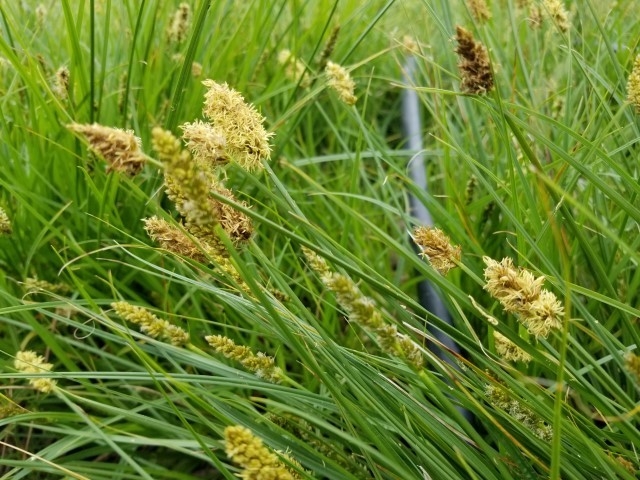Dense Sedge
(Carex densa)
Dense Sedge (Carex densa)
/
/

© Gail A Baker
CC BY 4.0
Image By:
© Gail A Baker
Recorded By:
Copyright:
CC BY 4.0
Copyright Notice:
Photo by: © Gail A Baker | License Type: CC BY 4.0 | License URL: http://creativecommons.org/licenses/by/4.0/ | Uploader: ribes2018 | Publisher: iNaturalist |

























Estimated Native Range
Summary
Carex densa, commonly known as Dense Sedge, is a tussock-forming perennial sedge native to riparian zones, wet meadows, and freshwater marshes in western North America, including the Pacific Northwest and California. It typically grows to a height of 1-2 feet (30-60 cm) and can spread to form dense clumps up to 3 feet (1 meter) wide. The plant features grass-like leaves that are dark green, and it produces small, brownish-green flowers in the late spring to early summer. The flowers are not particularly showy, but they do contribute to the plant’s naturalistic appearance.
Dense Sedge is valued for its ability to stabilize soil and support wildlife, making it a popular choice for habitat restoration and erosion control projects. It is also used in rain gardens and as a ground cover in wet areas of the landscape. Carex densa prefers consistently moist to wet soils and can tolerate a range of soil types, from sandy to clay, as long as they are well-drained. It thrives in full sun to part shade conditions. While generally low-maintenance, it can become invasive if conditions are ideal, spreading by rhizomes to form large colonies.CC BY-SA 4.0
Dense Sedge is valued for its ability to stabilize soil and support wildlife, making it a popular choice for habitat restoration and erosion control projects. It is also used in rain gardens and as a ground cover in wet areas of the landscape. Carex densa prefers consistently moist to wet soils and can tolerate a range of soil types, from sandy to clay, as long as they are well-drained. It thrives in full sun to part shade conditions. While generally low-maintenance, it can become invasive if conditions are ideal, spreading by rhizomes to form large colonies.CC BY-SA 4.0
Plant Description
- Plant Type: Grass
- Height: 1-1.5 feet
- Width: 1-2 feet
- Growth Rate: Moderate
- Flower Color: N/A
- Flowering Season: Summer
- Leaf Retention: Evergreen
Growth Requirements
- Sun: Full Sun, Part Shade
- Water: Medium
- Drainage: Fast, Medium, Slow
Common Uses
Deer Resistant, Erosion Control, Low Maintenance, Water Garden
Natural Habitat
Native to riparian zones, wet meadows, and freshwater marshes in western North America
Other Names
Common Names: Oregon Sedge, Dense-Head Sedge
Scientific Names: , Carex densa, Carex breviligulata, Carex brongniartii, Carex brongniartii var. densa, Carex chrysoleuca, Carex dudleyi, Carex vicaria, Carex vicaria var. costata, Carex vulpinoidea f. costata
GBIF Accepted Name: